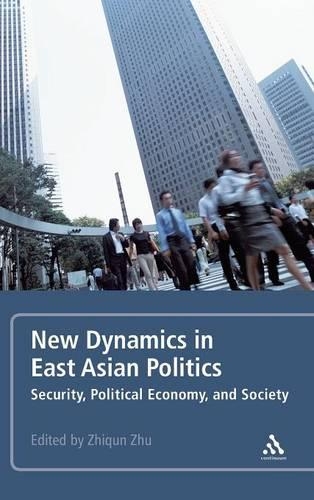
New Dynamics in East Asian Politics: Security, Political Economy, and Society
(Hardback)
Publishing Details
New Dynamics in East Asian Politics: Security, Political Economy, and Society
By (Author) Dr. Zhiqun Zhu
Continuum Publishing Corporation
Continuum Publishing Corporation
12th April 2012
United States
Classifications
Professional and Scholarly
Non Fiction
Comparative politics
327.5
Physical Properties
Hardback
368
Description
East Asia is changing and students need to grasp the new dynamics that shape politics and society across the region. This collection of essays by respected scholars examines the impact of development at the societal, national, and international levels on the conduct of politics in East Asia.
The chapters in this unique comparative tool are organized in sections around the themes of security and foreign policy, the new political economy, and changing societies, with each section featuring a mix of region-wide and country specific chapters. The book explains what are the new features and developments in East Asian politics today. It also examines how nations, more specifically China, Japan, both Koreas, and Taiwan are responding to challenges such as globalization, information technology, and the global recession as well as the impact of resulting domestic and foreign policies for the region and the world.
Its comparative nature, broad coverage, and pedagogical apparatus will make this text a key resource to teach East Asian politics at the undergraduate level.
Reviews
"The East Asian states have gone through tremendous economic, political and social change since the end of WWII, and this edited volume provides a truly comparative view of these changes and their implications for security, political economy and society in the region. This volume will be especially valuable to those interested in how the new political economy and security relationships in the region might influence regional political or social change, especially as seen in Mary Alice Haddad's chapter on media and environmental politics in East Asia." -Jessica C. Teets, Associate Editor, Journal of Chinese Political Science and Assistant Professor, Department of Political Science, Middlebury College, USA
"Zhiqun Zhu has ably assembled precisely what the field needs: a current anthology of accessible yet scholarly pieces that focus on a wide variety of political, security, economic, and social aspects of East Asia. In a field that is changing constantly, teaching resources in East Asian studies tend to become dated quickly. New Dynamics in East Asian Politics: Security, Political Economy, and Society helps address that problem, providing current treatments of issues in China, Japan, Korea, and Taiwan." -- Steven F. Jackson, Professor of Political Science, Indian University of Pennsylvania, USA
"This is an ambitious book to examine the important trends in security and foreign policy, political economy and social developments in East Asia. It adapts an inter-disciplinary approach and focuses on significant questions. The relatively young team of authors exploits the state-of-the-art methodologies and offers a multi-cultural perspective. While the volume attempts to appeal to both experts and university students, the general readership should find it interesting and stimulating. While the economic performance of East Asia attracts ample international media attention, its causes, implications and future challenges are not easily understood. Zhiqun Zhu's edited work succeeds in providing a foundation for a comprehensive grasp of the eminent issues." -- Joseph Cheng, Chair Professor of Political Science, Department of Public and Social Administration, City University of Hong Kong
Author Bio
Zhiqun Zhu is John D. and Catherine T. MacArthur Chair in East Asian Politics and Associate Professor of Political Science and International Relations at Bucknell University, USA. He is the author of China's New Diplomacy: Rationale, Strategies and Significance (Ashgate, 2010); Understanding East Asia's Economic "Miracles" (Association for Asian Studies, 2009); US-China Relations in the 21st Century (Routledge, 2006); and The People's Republic of China Today: Internal and External Challenges (ed., World Scientific Publishing, 2010).
